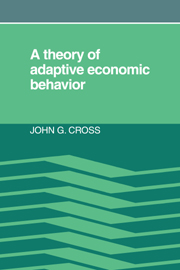Book contents
- Frontmatter
- Contents
- Preface
- 1 Introduction
- 2 Models of convergence
- 3 Behavior in the short run
- 4 Uncertainty
- 5 An application to state lottery games
- 6 An application to the problem of search behavior
- 7 Inflationary disequilibrium
- 8 Advertising and imitation
- 9 An application to migration
- 10 Conclusions
- References
- Index
- Frontmatter
- Contents
- Preface
- 1 Introduction
- 2 Models of convergence
- 3 Behavior in the short run
- 4 Uncertainty
- 5 An application to state lottery games
- 6 An application to the problem of search behavior
- 7 Inflationary disequilibrium
- 8 Advertising and imitation
- 9 An application to migration
- 10 Conclusions
- References
- Index
Summary
All human reasoning must be placed second to direct experience. Hence they will philosophize better who give assent to propositions that depend upon manifest observations, than they who persist in opinions repugnant to the senses and supported only by probable reasons.
Galileo Galilei Second letter to Mark Welser on sunspotsEconomics is outstanding among the social sciences for the active role its practitioners play in the formulation of public policy and corporate decisions. Whether or not their advice is followed, economists are routinely consulted on matters ranging from food-stamp programs to social security, from cost control to market forecasting, from oil leasing to tax policy, and from health-care delivery to defense spending. What is surprising is that those who seek this advice would, like most reasonable people, reject out of hand the behavioral principles on which these consultants rely. The gross oversimplification of production technology, the restriction to only a few distinguishable market structures, and particularly the reliance on an idealized model of maximizing decision making are so at variance with everyday experience that if economists stressed these as vigorously as they do the conclusions based on them, the profession would be classified as a form of medieval Scholasticism instead of a modern social science. The view that has become traditional is that these apparently unrealistic “assumptions” are vindicated by the success of the models they generate, and most economists may now be placed somewhere along a continuum ranging from those who accept these premises as approximations to the truth that are adequate for the purposes at hand to those who accept them in their entirety as valid empirical propositions in their own right.
- Type
- Chapter
- Information
- A Theory of Adaptive Economic Behavior , pp. 1 - 14Publisher: Cambridge University PressPrint publication year: 1983



